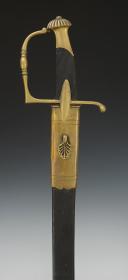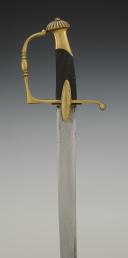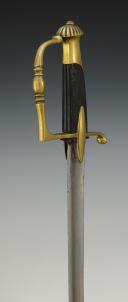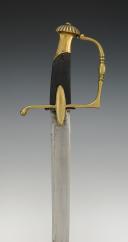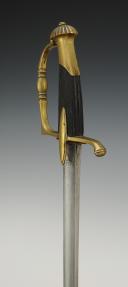
INFANTRY OFFICER'S SABER OF THE SPANISH ARMY, Reign of Isabel II, 1833-1868. 26412
Sold out
INFANTRY OFFICER'S SABER OF THE SPANISH ARMY, Reign of Isabel II, 1833-1868. 26412
Brass frame. One-branch guard with oval-shaped lugs. Short-tailed cap with gadrooned pommel, known as “melon ribs”. Finely squared ebony handle. Scarlet cloth tie. Slightly curved blade with hollow sides, length 71 cm, engraved on each side near the heel of the arms of the Kingdom of Spain surmounted by the royal crown. Leather scabbard with two brass fittings decorated with festoon-cut lines and edges.
Kingdom of Spain.
Reign of Isabella 1833-1868.
Good condition, worn blade with rubbed engraving.
NOTE :
This type of saber is very close to the French sabers for infantry officers of the First Empire and the Restoration. Only a few variations distinguish it in the curvature of the blade and the sting of the brass scabbard.
BIOGRAPHY :
Isabella II (or Isabel II in Spanish), born October 10, 1830 in Madrid and died April 9, 1904 in Paris1, was Queen of Spain from 1833 to 1868.
HISTORY:
This shako plate dates from the First Carlist War
The First Carlist War was a civil war that took place in Spain between 1833 and 1839, with significant international repercussions. It begins with the death of Ferdinand VII which causes a crisis between the regent Marie-Christine, Ferdinand's wife, and his brother, Charles (Don Carlos).
Maria Christina of Spain, widow of Ferdinand VII and mother of Isabella II, exercised the regency during her daughter's minority. Painting made by Winterhalter in 1841.
It continued in a diplomatic crisis between France and Great Britain in the 1840s.
The succession crisis of 1833
In 1833, King Ferdinand VII died after designating his daughter Isabella, aged only three, as his successor, thus depriving his brother Charles of the throne.
The nobility supported the more conservative Infante Charles against the liberals who took the side of the regent.
A civil war ensued between the supporters of the young queen and the Carlists.
Civil war and foreign intervention
This civil war had its consequences felt especially in the north of the country, the Carlists being particularly strong in the Basque provinces and Navarre, who defended their privileges (fors) against the centralizing liberals.
The Franco-British crisis over the Spanish succession (1846)
France, having achieved victory, believes it has acquired a monopoly of influence over Spain, a monopoly called into question by the United Kingdom. A friendly understanding had been established in Eu between Louis-Philippe I and Queen Victoria regarding the marriage of the young queen in Spain, French influence being confirmed there. But the fall of the Peel government in 1846 changed the climate of Franco-British relations and the return of Palmerston - stubbornly anti-French - to foreign affairs, revived the rivalry of the two countries.
Lord Palmerston and the conduct of Sir Henry Bulwer (future Lord Dalling) in Madrid led Guizot to believe that the agreement was broken, and that it was planned to put a Saxe-Coburg on the Spanish throne.
Determined to resist such an intrigue, Guizot and King Louis-Philippe I precipitately launched into a counter-plot completely contrary to their commitment to the United Kingdom and fatal to the happiness of the Queen of Spain. By their influence, she was pushed to marry her first cousin François de Bourbon, and her sister married to the youngest son of the king of the French, in violation of the promises of Louis-Philippe. Although this action was carried out at a time of triumph in French politics, it was in truth fatal to the monarchy by helping to discredit the minister.
Its immediate effect was the breakdown of the Franco-British alliance, throwing Guizot into closer cooperation with the absolutist Metternich and the courts of northern Europe. In France, this rapprochement displeases liberals.
Under the leadership of General Zumalacárregui, an army of 13,000 Carlists won a series of victories, but the government army established a line of defense (Bilbao-Vitoria-Ebro Valley) which the Carlists were unable to break.
Isabel II's troops will then benefit from external aid. In 1834, France, Portugal and the United Kingdom signed the Quadruple Alliance treaty with the Spanish government. The United Kingdom sends a group of volunteers (the British Legion). King Louis-Philippe ceded the Foreign Legion to Spain, which then fought in Algeria and arrived in Spain in August 1835 (the Legion officially became part of the Spanish army).
The war ended in 1839 with the Ognate Convention (or Vergara Convention) of August 29, 1839 by which the Carlists recognized their defeat.
Brass frame. One-branch guard with oval-shaped lugs. Short-tailed cap with gadrooned pommel, known as “melon ribs”. Finely squared ebony handle. Scarlet cloth tie. Slightly curved blade with hollow sides, length 71 cm, engraved on each side near the heel of the arms of the Kingdom of Spain surmounted by the royal crown. Leather scabbard with two brass fittings decorated with festoon-cut lines and edges.
Kingdom of Spain.
Reign of Isabella 1833-1868.
Good condition, worn blade with rubbed engraving.
NOTE :
This type of saber is very close to the French sabers for infantry officers of the First Empire and the Restoration. Only a few variations distinguish it in the curvature of the blade and the sting of the brass scabbard.
BIOGRAPHY :
Isabella II (or Isabel II in Spanish), born October 10, 1830 in Madrid and died April 9, 1904 in Paris1, was Queen of Spain from 1833 to 1868.
HISTORY:
This shako plate dates from the First Carlist War
The First Carlist War was a civil war that took place in Spain between 1833 and 1839, with significant international repercussions. It begins with the death of Ferdinand VII which causes a crisis between the regent Marie-Christine, Ferdinand's wife, and his brother, Charles (Don Carlos).
Maria Christina of Spain, widow of Ferdinand VII and mother of Isabella II, exercised the regency during her daughter's minority. Painting made by Winterhalter in 1841.
It continued in a diplomatic crisis between France and Great Britain in the 1840s.
The succession crisis of 1833
In 1833, King Ferdinand VII died after designating his daughter Isabella, aged only three, as his successor, thus depriving his brother Charles of the throne.
The nobility supported the more conservative Infante Charles against the liberals who took the side of the regent.
A civil war ensued between the supporters of the young queen and the Carlists.
Civil war and foreign intervention
This civil war had its consequences felt especially in the north of the country, the Carlists being particularly strong in the Basque provinces and Navarre, who defended their privileges (fors) against the centralizing liberals.
The Franco-British crisis over the Spanish succession (1846)
France, having achieved victory, believes it has acquired a monopoly of influence over Spain, a monopoly called into question by the United Kingdom. A friendly understanding had been established in Eu between Louis-Philippe I and Queen Victoria regarding the marriage of the young queen in Spain, French influence being confirmed there. But the fall of the Peel government in 1846 changed the climate of Franco-British relations and the return of Palmerston - stubbornly anti-French - to foreign affairs, revived the rivalry of the two countries.
Lord Palmerston and the conduct of Sir Henry Bulwer (future Lord Dalling) in Madrid led Guizot to believe that the agreement was broken, and that it was planned to put a Saxe-Coburg on the Spanish throne.
Determined to resist such an intrigue, Guizot and King Louis-Philippe I precipitately launched into a counter-plot completely contrary to their commitment to the United Kingdom and fatal to the happiness of the Queen of Spain. By their influence, she was pushed to marry her first cousin François de Bourbon, and her sister married to the youngest son of the king of the French, in violation of the promises of Louis-Philippe. Although this action was carried out at a time of triumph in French politics, it was in truth fatal to the monarchy by helping to discredit the minister.
Its immediate effect was the breakdown of the Franco-British alliance, throwing Guizot into closer cooperation with the absolutist Metternich and the courts of northern Europe. In France, this rapprochement displeases liberals.
Under the leadership of General Zumalacárregui, an army of 13,000 Carlists won a series of victories, but the government army established a line of defense (Bilbao-Vitoria-Ebro Valley) which the Carlists were unable to break.
Isabel II's troops will then benefit from external aid. In 1834, France, Portugal and the United Kingdom signed the Quadruple Alliance treaty with the Spanish government. The United Kingdom sends a group of volunteers (the British Legion). King Louis-Philippe ceded the Foreign Legion to Spain, which then fought in Algeria and arrived in Spain in August 1835 (the Legion officially became part of the Spanish army).
The war ended in 1839 with the Ognate Convention (or Vergara Convention) of August 29, 1839 by which the Carlists recognized their defeat.
Reference :
26412
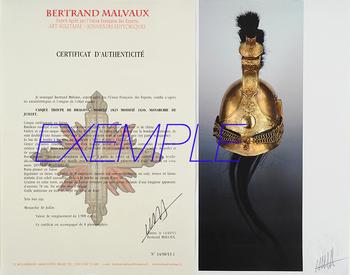
Next update Friday, april 4th at 1:30 PM
FOR ALL PURCHASES, PAYMENT IN MULTIPLE CHECKS POSSIBLE
bertrand.malvaux@wanadoo.fr 06 07 75 74 63
An authenticity certificate of the item including the description published on the site, the period, the sale price, accompanied by one or more color photographs is automatically provided for any item priced over 130 euros. Below this price, each certificate is charged 5 euros.
Only items sold by me are subject to an authenticity certificate, I do not provide any expert reports for items sold by third parties (colleagues or collectors).
